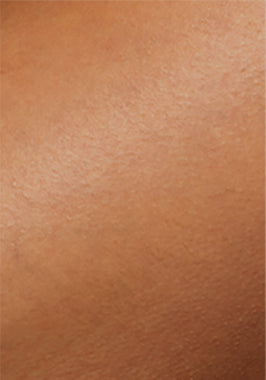Laser hair removal is a popular procedure for those looking for a permanent solution to unwanted hair. According to the American Academy of Dermatology, the results of a laser last for months to years [1] . With this in mind, everyone has similar expectations when it comes to laser hair removal.
However, individual variations may occur as each person has a different skin and hair type, color and body condition. This means that the method is very effective for some people, while others see no results.
Are you wondering why laser hair removal doesn't work for you? Here you will find out the reason and the solutions.

- Part 1: Signs that laser hair removal is not working
- Part 2: Why Laser Hair Removal May Not Work
- Part 3: What to do if laser hair removal doesn’t work?
- Part 4: Patience and realistic expectations
- Part 5: Conclusion
Signs that laser hair removal is not working
Lack of hair reduction
Laser hair removal offers a long-term solution [2] for unwanted, constantly growing hair on your body. The heat that the laser generates as it penetrates your body causes damage to the hair follicles, resulting in hair removal.
However, if you don't see any results even after several sessions, it means that laser hair removal is not working for you.
Hair regrowth
Laser hair removal is most effective when hair is in the anagen phase. However, each hair follicle has its own hair growth cycle, so not all hairs are in the same phase at the same time. Therefore, multiple laser sessions are required to remove all hair in the anagen phase.
With each session, you will see a reduction in hair of 10-20%. However, if you notice significant hair regrowth in the treated area, it means the laser is not working for you.

Inconsistent results
While some of your hair is in the anagen phase, others may be in the transition or resting phase at the same time. Laser hair removal is more effective in the anagen phase, so you may notice patchy areas during your sessions.
However, if the hair removal results are uneven or hair reduction in certain treated areas is less than expected, this indicates that the treatment is ineffective.
Why laser hair removal may not work
When you notice that laser hair removal is not working, your mind will try to find a reason why.
Short treatment time
Each body region requires a certain amount of time for laser hair removal. Larger areas require more time, while smaller areas can be treated more quickly. For example, for the face you need less than 30 minutes, for the legs up to an hour.
If this time is not respected during the treatment and the treatment is rushed, the effectiveness of laser hair removal will be less. This is because the laser energy is not absorbed equally in all areas, resulting in uneven hair removal results.

Hormonal imbalance
Hair growth in men and women is related to the hormone levels in the body. One of the hormones responsible for hair growth is testosterone. Men have higher testosterone levels, so the number of hairs in them is higher than in women.
In certain diseases such as During PCOS or menopause, testosterone levels in women rise above normal levels, leading to excessive hair growth. Consequently, laser has poor efficacy in conditions such as PCOS [3] , menopause, Cushing's disease and other hormonal problems.
Incorrect procedure for laser hair removal
Laser hair removal depends a lot on your practitioner. If he is an experienced professional, the process will go smoothly, but if he uses incorrect procedures, it can affect the results.
For example, different lasers are used for different hair and skin types. The Nd:YAG laser is best for dark skin types and the diode laser for coarse hair. However, if the practitioner has chosen the wrong laser, it will be ineffective or even harmful.

Other incorrect practices include:
- Start of treatment without excluding diseases or contraindicated medications
- Performing the procedure with the wrong intensity for a specific area
- A single treatment approach for all
Improper preparation before lasering
It can be not only the fault of the operator but also your negligence. So if you do laser hair removal without proper preparation, the results will be different.
For example, removing hair before laser hair removal is beneficial, but only by shaving. Additionally, if you go to laser removal with tanned skin, do not exfoliate, and do not stick to your hair removal plan, you may experience minimal or no results.
What to do if laser hair removal doesn't work?
Now let's see how you can solve the problem.
Communicate with the provider
The very first thing you can do to resolve the issue is to communicate with your provider. This includes having a detailed consultation with the clinic prior to the session and then discussing results and expectations during your sessions.
A consultation before your actual appointment can help the practitioner to better understand your skin and hair and tailor their work accordingly. Discussing your problems during sessions can also help them determine if the plan needs to be changed.

Adjusting the treatment parameters
The settings used to perform laser hair removal depend on your skin and hair type. These settings vary from person to person. If laser hair removal does not work for you in certain settings, you can discuss this with your practitioner.
In a joint discussion, the practitioner can consider whether he or she can adapt the laser settings to your needs and expectations.
Consider alternative methods of hair removal
Another option is to change your hair removal method. It is true that waxing , epilation , plucking , etc. cannot produce as good results as laser hair removal, but it is better than nothing.
Additionally, if you are looking for a method that is as permanent as laser hair removal, you can try either IPL or electrolysis. IPL works similarly to laser hair removal and can be more convenient and cost-effective than laser with the Ulike Sapphire Air 10 . The device is safe to use at home and shows noticeable results [4] . With 1 million flashes, it works for years.
Electrolysis , on the other hand, shows permanent results. Although the procedure is a bit painful, every skin type and hair color can benefit from this method.

Get a second opinion
There are times when you follow all the steps of your plan thoroughly, but still don't get results. It's helpful to talk to your specialist, but you can also get a second opinion. Most people avoid this because it can be confusing.
However, consulting another professional can help you see things from a different perspective and there is a chance that another specialist will better understand your skin and its needs.
Treatment of underlying medical conditions
Finally, it is important to understand that laser hair removal or any other method will only meet your expectations if your body is healthy and fit for the procedure.
In case of pituitary gland disorders, hormonal imbalance and tumors in the ovaries, the results will not be as productive as you expect. Therefore, consult your doctor to treat your hormonal problems and other medical disorders.
By working on the condition of your body, you can improve the results of laser hair removal.

Patience and realistic expectations
That being said, those who are considering trying laser hair removal treatment or have already started should be patient and have realistic expectations. As mentioned, laser hair removal is not a one-time thing. Multiple sessions are needed to remove all the hair in the growth phase, which can take a while.
While there is hair reduction, hair growth will not be completely stopped in just one session, so don't panic if you notice hair regrowth as long as it is not worse than before and wait patiently until your last session.
You should also know that the procedure is long-term but not permanent. Therefore, you should have realistic expectations about the results. This attitude will help you get through the procedure without disappointment.

Conclusion
If you notice hair regrowth, patchy or uneven hair growth, and no hair reduction after laser hair removal, it means the method is not working for you. This may be due to incorrect hair removal technique, hormonal imbalance, or incomplete preparation on your part before hair removal.
To resolve this, first talk to your provider and discuss your observations and expectations regarding results. You may also want to consult another professional or consider treating any conditions that may be affecting results.
credentials
[1] Laser Hair Removal: FAQs: American Academy of Dermatology
https://www.aad.org/public/cosmetic/hair-removal/laser-hair-removal-faqs
[2] Gan SD, Graber EM. Laser hair removal: a review. Dermatol Surg. 2013 Jun;39(6):823-38. doi: 10.1111/dsu.12116. Epub 2013 Jan 17. PMID: 23332016.
https://pubmed.ncbi.nlm.nih.gov/23332016/
[3] McGill DJ, Hutchison C, McKenzie E, McSherry E, Mackay IR. Laser hair removal in women with polycystic ovary syndrome. J Plast Reconstr Aesthet Surg. 2007;60(4):426-31. doi: 10.1016/j.bjps.2006.11.006. Epub 2007 Jan 16. PMID: 17349600.
https://pubmed.ncbi.nlm.nih.gov/17349600/
[4] El Bedewi, Ahmed F. “Hair removal with intense pulsed light.” Lasers in medical science vol. 19,1 (2004): 48-51. doi:10.1007/s10103-004-0298-6





























1 comment
Kastenhuber Roswitha
Habe ich auch Erfolg bei grauen Haar.
Über eine Rückmeldung würde ich mich freuen
Mfg Kastenhuber
Habe ich auch Erfolg bei grauen Haar.
Über eine Rückmeldung würde ich mich freuen
Mfg Kastenhuber